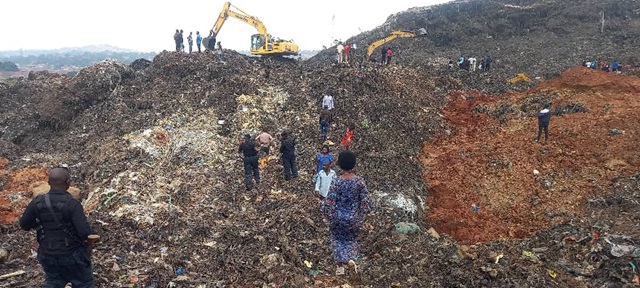Dr. Gardner R. Herbert (PhD)
Background
Uganda’s waste management system is facing severe challenges, particularly in urban areas where rapid population growth and industrialization have outpaced the capacity for effective waste disposal.The Kiteezi landfill, located on the outskirts of Kampala, serves as a stark example of these challenges. Originally intended to handle the city’s waste, Kiteezi has become overwhelmed due to inadequate infrastructure, poor management, and the lack of a sustainable waste processing strategy. This failure has resulted in significant environmental degradation and health risks for nearby communities, underscoring the urgent need for comprehensive waste management reforms in Uganda.
Introduction
Uganda’s waste management crisis has reached a tipping point, with the Kiteezi landfill disaster that happened on 12th August 2024 serving as a stark and tragic illustration. Located in Kampala, Kiteezi was once the city’s primary waste disposal site, but years of mismanagement, overcrowding, and poor infrastructure have led to its collapse, both figuratively and literally. The landfill, overwhelmed by the sheer volume of waste, recently gave way, causing a catastrophic landslide that claimed lives and highlighted the environmental hazards of inadequate waste management . This disaster is not an isolated incident but rather a symptom of a broader systemic failure that plagues waste management in Uganda.
The country’s rapid urbanization, coupled with insufficient waste processing infrastructure and public apathy, has turned waste into a ticking time bomb .
Addressing this crisis requires more than just technical solutions; it demands a fundamental shift in mindset education that which change Ugandans perspective on how manage waste.
As an expert in mindset change and environmental sustainability, I believe that fostering collective responsibility, incentivizing sustainable practices, and employing behavioral nudges are key strategies that can transform Uganda’s waste management practices. By drawing on psychological theories and global examples, this article outlines a blueprint for how Uganda can move towards a cleaner, healthier, and more sustainable future.
- Cultivating a Sense of Collective Responsibility
The Theory of Planned Behavior (TPB) suggests that people’s behavior is influenced by their attitudes, perceived social norms, and perceived behavioral control (Ajzen, I. (1991).). Imagine a village where every person is responsible for adding a brick to build a protective wall around their community. If everyone contributes, the wall is strong and secure; if even a few neglect their duty, the wall crumbles. In the same way, proper waste management relies on everyone playing their part. When each person takes responsibility, the whole community thrives, therefore, fostering a mindset of collective responsibility. This inspires individuals to engage in proper waste management practices because they feel their actions contribute to the greater good.
Japan is a prime example of a country where a strong sense of collective responsibility has been ingrained in the culture. Japanese communities emphasize the importance of waste separation and proper disposal from a young age. Schools teach students how to manage waste correctly, and neighborhood associations organize regular clean-up events. This collective mindset has led to Japan having one of the highest recycling rates in the world, with over 80% of PET bottles being recycled (Japan Environment Quarterly, 2020). When people perceive that proper waste management is not only a personal responsibility but also a socially expected behavior, and when they believe that their individual actions can make a significant impact, they are more likely to engage in sustainable practices through reinforcing positive attitudes towards waste management, establishing strong social norms that value environmental stewardship, and empowering individuals with the knowledge and tools to control their actions.For instance, research shows that when communities are made aware of the environmental and health hazards associated with improper waste disposal, their participation in waste management programs increases by up to 40% (Chaudhary, Vrat, & Shankar, 2018). This approach can be integrated into educational curricula, community meetings, and public service announcements to instil a shared sense of duty towards maintaining a clean environment. - Incentivizing Sustainable Waste Management Practices
Operant Conditioning Theory, proposed by B.F. Skinner (1953) highlights that behavior can be shaped through rewards and punishments. Positive reinforcement can be used to encourage desirable behaviors, such as proper waste disposal.
Think of waste management like planting a garden. When you water your plants (positive behavior), they grow and flourish, rewarding you with beautiful flowers or tasty fruits. If you neglect them, the garden withers. Similarly, when people are rewarded for proper waste disposal, they are more likely to continue doing it, resulting in a cleaner environment.
In Uganda, the application of Operant Conditioning Theory can be a powerful tool to promote sustainable waste management practices. By implementing reward-based systems that recognize and incentivize individuals and communities for proper waste disposal, the government and organizations can reinforce positive behaviors. For instance, initiatives such as providing financial rewards, public recognition, or discounts on services for those who consistently engage in recycling or proper waste segregation can motivate others to adopt similar practices (Tan, S. S., & Lam, T. W. (2019).). Over time, these positive reinforcements can help build a culture of sustainability, where the majority are inclined to manage waste responsibly, leading to a cleaner and more environmentally conscious society. By aligning incentives with desirable behaviors, Uganda can effectively reduce littering and promote sustainable waste management across the country.
South Korea is an excellent example of a country that has successfully implemented incentive-based waste management programs. South Korea introduced a volume-based waste fee system, where households pay for waste disposal based on the amount they generate. The system also rewards households for separating recyclable materials properly. As a result, the country has seen a significant reduction in waste (South Korea Ministry of Environment. (2017).) - Enhancing Awareness Through Behavioral Nudges theory as introduced by Richard Thaler and Cass Sunstein, suggests that subtle changes in the environment can lead to significant shifts in behavior without restricting options or significantly changing economic incentives (Linder, T., & Torfaen, S. (2016).).
Imagine Uganda as a garden, with each citizen as a gardener responsible for nurturing the land. In this garden, the paths to sustainability are often overgrown, making it difficult for gardeners to find the right way to dispose of their waste. Behavioral nudges act like gentle guideposts, subtly clearing and marking the paths so that each gardener can easily find the compost heap or recycling bin instead of tossing waste onto the ground (Schultz, P. W., Bator, R. J., & Large, L. B. 2013). Just as these guideposts help gardeners keep the garden thriving, well-placed nudges in public spaces—such as clear signage and accessible waste bins can guide Ugandans towards better waste management, helping to cultivate a cleaner, healthier environment for everyone.
Like a gentle breeze that subtly shifts the direction of a boat, behavioral nudges can steer individuals towards more sustainable practices without imposing strict regulations. By strategically altering the environment to make proper waste disposal the easier and more attractive option, the government can promote a cleaner and healthier community (Schultz, P. W., et al. (2013).
A compelling example of the successful application of Nudge Theory can be found in Denmark, a country renowned for its effective waste management system. In Copenhagen, the government implemented a series of behavioral nudges, including brightly colored waste bins with clear labeling and humorous signage that encouraged proper waste disposal. As a result, the city saw a significant reduction in littering, with a study reporting a 43% decrease in improperly disposed waste within just six months (Linder & Torfaen, 2016). By drawing on such examples and adapting them to the Ugandan context, the government can harness the power of subtle environmental changes to enhance waste management practices across the country.
The government can use behavioral nudges to promote proper waste management. For example, placing clear signage and convenient waste disposal bins in high-traffic areas can nudge people towards using them rather than littering. A study in the United Kingdom found that strategically placed signs and bins led to a 46% reduction in littering in urban areas (Schultz et al., 2013). By making the desired behavior easier and more accessible, people are more likely to adopt it.
Conclusion
To prevent future tragedies like the one in Kiteezi, the government should prioritize mindset change as part of its waste management strategy. This can be achieved through education that fosters collective responsibility, incentivizing sustainable practices, and applying behavioral nudges to make proper waste disposal a habitual action. By addressing the mental and behavioral aspects of waste management, Uganda can move towards a safer and cleaner environment for all its citizens. Gardner RH, PhD
The Author is a lecturer at Nkumba University School of law,
His also the Founder – Conscious Awareness and Mind growth Academy



















Discussion about this post